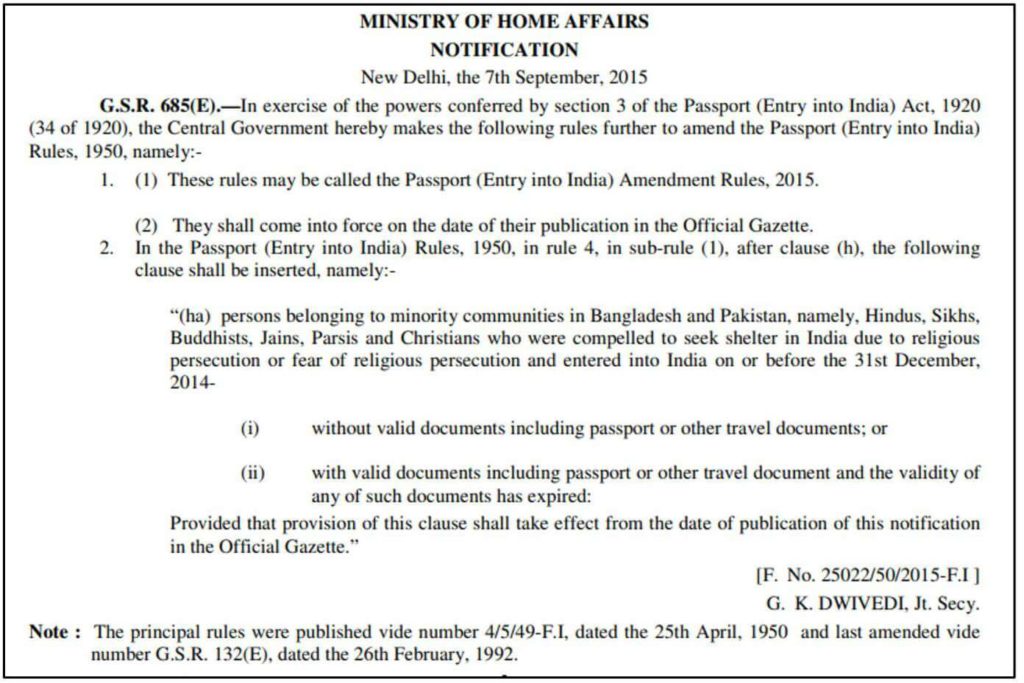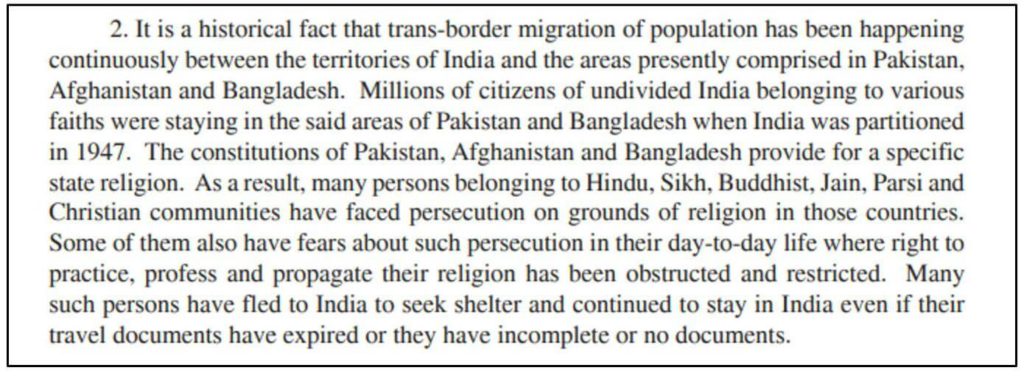Here is a list of FAQs on the CAA and what it means for various sections of people.
In an earlier story on Factly, we explained what the Citizenship Act is and how an individual can acquire Indian citizenship. The story also looked at the amendment made to the act this year. This story takes a look at some frequently asked questions pertaining to the Citizenship Amendment Act (CAA). In the subsequent story, we would address some questions related to the National Register of Citizens (NRC).
What is the CAA all about?
According to the CAA, Hindus, Sikhs, Parsis, Jains, Christians and Buddhists who entered India from Afghanistan, Pakistan and Bangladesh on or before 31 December 2014 will not be considered as illegal migrants. Since CAA only exempts persons from these 6 religions & 3 countries, migrants in India who do not belong to those religions and countries will be deemed illegal if they do not have valid documents or have overstayed in India. At the same time, CAA is not directly related to Indian citizens.
What are the benefits they get under CAA?
Under the CAA, the period of stay for naturalisation has also been reduced to six years (5 years plus one year before the application) for persons from the 6 religions & 3 countries. People belonging to other religions such as Muslims from these countries can apply for citizenship in India but they should have lived in the country for 12 years (11 years plus one year before the application). However, those who are deemed illegal migrants will not be eligible to apply for citizenship.
Does the law favour only persecuted religious minorities from the three countries?
In the CAA, it has not been explicitly mentioned that the law is for those minorities who have been persecuted on religious grounds. However, the object of the bill states that the amendment was made to help the religious minorities who faced persecution in the three countries on the grounds of religion.

Reference has also been made in the CAA to Passport (Entry to India) Act of 1920 and rules made under the same. The Passport (Entry into India) Rules was altered by the Central Government in 2015 exempting religious minorities- Buddhists, Sikhs, Jains, Hindus, Parsis and Christians from Pakistan and Bangladesh, who were forced to come to India due to religious persecution prior to 2015, from being considered as illegal migrants.

This was further amended in July 2016 to include those from Afghanistan also.
Is it not possible for other foreigners to apply for citizenship?
CAA does not deny other foreigners from applying for citizenship. Any foreigner who has valid documents such as passport, visa and other documents which have been notified by the government of India, can apply for citizenship. However, it is mandatory that the person applying has lived in India for 11+1 years (as explained in the earlier story). Religious minorities from other countries too can apply for citizenship provided they qualify as per the criteria notified by the government. But as explained earlier, those deemed illegal migrants will not be able to apply for citizenship except the ones from the 6 religious minorities from the 3 countries.
Foreigners who wish to stay in India for more than 180 days should have Long Term Visas (LTV). The government has also made provisions to provide Long Term Visas to those who come to India from Pakistan, Afghanistan and Bangladesh seeking permanent settlement.
However, those Muslim migrants in India and those from other countries who have not been covered under CAA and do not possess necessary documents will not be able to apply for citizenship unless the government decides to consider their case in specific (like in the case of Sri Lankan Tamils).
For those who claim to be refugees, the Ministry of Home Affairs (MHA) has issued a standard operating procedure to be followed before granting them an LTV.
What about persecuted religious minorities other neighbouring countries?
The minorities from other countries including Baluchis, Rohingayas and Ahmediyas can apply for citizenship if they fulfil the criteria mentioned in the Citizenship act. According to the Parliamentary Joint Committee report, the standard operating procedure issued by the government on 29 December 2011 should be adhered to for refugees/ persecuted minorities from other countries.

However, as seen earlier, those who do not possess valid documents will not be eligible to apply.
What is the need for CAA?
The object of the bill states that the religious minorities from the six religions have been facing persecution on grounds of religion.

According to a representative of Ministry of External Affairs, the amendment was needed to redress the issues faced by the religious minorities from the earlier mentioned countries as they could not return to their country for fear of religious persecution and that these three countries provide for a specific state religion, Islam. It was also stated that the ministry received representations requesting extension in visas and that lack of documents would result them being classified as illegal migrants.
Why have the three countries been included?
The government has included only the three countries of Afghanistan, Bangladesh and Pakistan which have Islam as the state religion. While Bangladesh and Pakistan were part of undivided India, the reason for inclusion of Afghanistan as per the Joint Committee report is because of ‘multiple attacks against Indian interests in Afghanistan by the Pakistan establishment sponsored LET, Haqqani Network and Taliban.’ The Ministry of Home Affairs also claimed that a number of people had come to India from Afghanistan following religious persecution or fear of religious persecution.
What is the evidence that the government will require in order to establish whether or not the migrant has been religiously persecuted?
The Government is yet to notify the rules under the CAA which will answer these questions.
However, during the Joint Committee’s discussion, MHA stated that inputs from security agencies and evidences in print and electronic media will be used for establishing religious persecution. How will this be proved in every individual case remains unanswered.

Why have some areas in the North East been excluded?
The areas falling in the Inner Permit Line and other areas in Schedule 6 where tribal and indigenous population are present have been excluded from the act so as to prevent the influx of migrants into these areas.
What will happen to those who entered India after 2015?
As per the act, they will have to apply for Long Term Visas and follow the criteria as listed in the citizenship act. No consideration will be given to them as of now.
What will happen to the illegal migrants under this law?
The CAA does not deal with actions taken against illegal migrants. The Passport (Entry into India) Act, 1920 and Foreigners Act, 1946 govern entry and exit of foreigners. It is based on these laws that detention and deportation of illegal immigrants takes place.
In a subsequent story, we will look at questions with respect to National Register of Citizens (NRC) and if NRC coupled with CAA could pose a threat to minorities in the country.
Featured Image: FAQs on CAA & NRC


